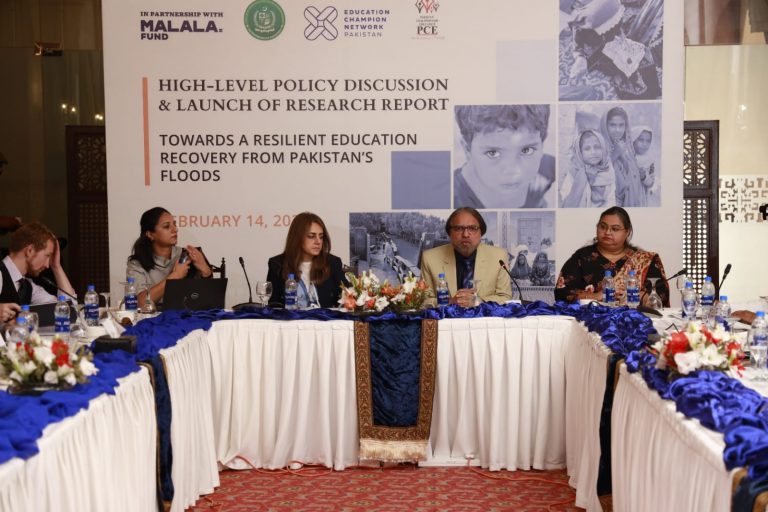
Country lacks emergency response planning within the education system and a lack of focus on widespread learning poverty among students.
Report on post-floods education situation in Pakistan ‘Towards a Resilient Education Recovery from Pakistan’s Floods – Rapid Response Research’ launched
Islamabad
Experts stressed the need to take immediate measures to recover the loss of learning during floods and develop a flood-resilient education system to prevent disruption to education in such calamities.
This was suggested during the launch of the report on the post-floods education situation in Pakistan, “Towards a Resilient Education Recovery from Pakistan’s Floods – Rapid Response Research,” published by Pakistan Coalition for Education (PCE) in collaboration with Education Champion Network (ECN).
A high-level policy discussion also took place on the sidelines of the launch organized by PCE in collaboration with the Ministry of Federal Education and Professional Training (MOFEPT), Malala Fund, and ECN. Representatives from the World Bank, JICA, FCDO, International Rescue Committee (IRC), UNICEF, and the UNDP participated in the policy roundtable.
The report highlighted several issues within education response in flood-affected areas. These include a lack of emergency response planning within the education system and a lack of focus on widespread learning poverty among students. The report calls for rigorous coordination between the district, federal and provincial governments for recovering learning losses and enhancing the educational infrastructure in Pakistan. The report also stresses the need to focus on students’ learning, rather than mere enrolment and rebuilding infrastructure.
The initial findings from this research have been incorporated into the Ministry of Planning, Development and Special Initiatives, Government of Pakistan and UNDP’s plan, ‘Pakistan Floods 2022: Resilient Recovery, Rehabilitation, and Reconstruction Framework’ in the section on education.
Speaking on the occasion, Waseem Ajmal, Additional Secretary MOFEPT said, “The 2022 floods have been devastating for Pakistan’s development. In education, 3.6 million children were affected and over 34,000 schools were damaged or destroyed. All education departments, including MOFEPT, are now working to ensure education continues for those children affected by the floods.
He said that this week the Minister will address the ‘Education Cannot Wait for High-Level Financing’ Conference in Geneva to advocate for increased support for children affected by the floods in Pakistan.
“Several districts across Pakistan that were affected by last year’s catastrophic floods are the same as where massive flooding occurred in 2010 and 2011. However, there is no evidence to suggest that any meaningful measures were taken during the decade between these two calamities to protect against disruption in children’s education during times of emergency,” expressed Zehra Arshad, Executive Director PCE.
“To structure an effective response to educational needs, this important report asks for using rapid response mechanisms like a public-private partnership to help build schools at a faster pace and more importantly to ensure that all girls and boys who had to experience major learning losses can rapidly keep up with learning,” said by Javed Malik, Program Director Malala Fund Pakistan office.
The author of the report Dr. Moizza Binat Sarwar said, “Given past examples from Pakistan, the rebuilding of damaged or destroyed infrastructure/schools has been the main strategy of education recovery. While this is important, evidence shows that merely building new brick-and-mortar buildings has had no significant impact on curtailing school drop-outs or improving learning outcomes.” The author also highlighted the lack of focus on rebuilding shock-resilient infrastructure that can survive the onset of another natural calamity.
During an interactive discussion participants highlighted the need to address long-term learning losses, and the importance of standardizing Temporary Learning Centers (TLCs) that had been set up in several flood-hit areas. Participants also discussed the need to avoid duplication of efforts by different development partners to ensure a wider outreach and a more effective overall response.
Senior Education Specialist at the World Bank, Izza Farrukh stressed the need to abandon complicated Student Learning Objectives in favor of a simple curriculum and assessment to facilitate the learning of affected students. (PR)
_______________